Outputs and impact
Over the lifetime of the project, various outputs have been produced that reflect the findings of the researchers and shine a light on the communities and individuals that have supported the project. Browse the different outputs and find out more about our engagement activities.
Project outputs
- Newsletter
The first edition of the Afterlives Newsletter is available here
The second edition of the Afterlives Newsletter is available here
The third edition of the Afterlives Newsletter is available here
The fourth edition of the Afterlives Newsletter is available here
- Occasional papers
Research Report - The Social Institutions of the United Kingdom’s “Afghan” Communities
Research Report - The Transformation of Afghanistan’s Commercial Networks Post 2021
Research Report - Non-Muslim Heritage of Muslim Asia
- Digital archive and collections
Whittingehame College Reunion (2023)
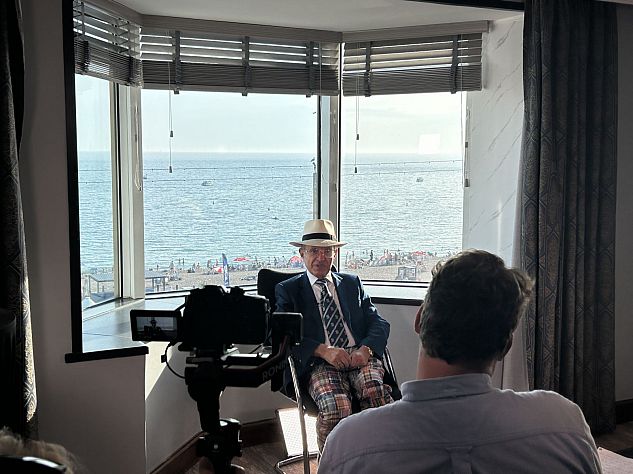
On 9 and 10t September 2023, the ‘old boys’ of Whittingehame College descended on a hotel on Brighton’s seafront from across the world. A Jewish boys’ school located in Brighton and Hove between 1931 and 1958 and in Handcross Park from 1958 until 1967, Whittingehame’s founder was the British Zionist, Jakob Halévy (1898 -1978). According to the school’s official biographer, Eric Shanes, Halévy’s ambition was to establish a ‘Jewish version of Eton’ - a school that would enable Jews to cultivate distinctive identities at the same time as playing a leading role in British life. During the years of its existence, the school underwent significant transformations. From educating British Jewry in the early 1930s, Whittingehame attracted Jewish students from Germany and central Europe in the mid-1930s. After the war, Jewish students from Muslim-majority countries in West Asia and North Africa (especially Lebanon, Syria, Turkey, Egypt, Iraq, Sudan, Iran and Afghanistan) increasingly sought admission to the school. The founding of the state of Israel in 1948 alongside the rise of postcolonial nationalism had led Jewish communities to question their future in the countries in which they lived. In the context of Israel’s uncertain future, and the nationalisation of the businesses in which they were active in countries such as Iraq and Egypt, Jewish families in the Middle East and North Africa sought educational and migration opportunities for their children in the UK and the USA. In the 1950s, Whittingehame also granted admission to Muslim students, including those from Iran, Turkey, Saudi Arabia and Egypt.
Whittingehame Old Boy's Club
In the context of an economic crisis, Whittingehame closed in 1967, yet it was of continuing significance for the identities, activities and social relationships of its former student body. In 1979, a group of old boys gathered at the Diplomat Hotel in Jerusalem to found the Whittingehame College Old Boy’s Club. From the mid-1980s onwards, the Club organised annual events attended by former students at locations in Israel, London and, in later years, Brighton.
The school’s connections to West Asian Jewry from the 1950s onwards is what makes it of special interest to the Afterlives project, which is concerned with the migratory and career trajectories of Jews from cities in West Asia. For several of the communities with which we are working, Whittingehame played an important role in such trajectories. Students identifying as Jews from Afghanistan and Syria studied at the school in the 1950s. During their time at the school, students from these backgrounds not only maintained their connections with Jews from their countries of origin both at school and in the UK, they also established relationships with those from other parts of the world, relationships that would play an important role for the rest of their social and professional lives. The significance of Whittingehame to the trajectories of Jews from Afghanistan and Syria is evident in the life histories and recollections of three of its former students: Jack Abrahams, David Khafi and Debo Attar.
Jack Abrahams
Jack Abrahams came to Whittingehame from Israel in 1957. He had moved earlier in the decade to Israel from Kabul, Afghanistan, the country in which his families had lived and conducted trade, especially in furs and carpets, for centuries. Jack has warm memories of his time at Whittingehame, especially the friendships he established with his fellow students: “We were away from our families”, he remarked, “and so the relationships we established were more than friendship, we became what I refer to as ’brotherly friends’ ”. While studying at Whittingehame, Jack was also in contact with others Jews from Afghanistan living in London, including a fur merchant who acted as his guarding during his time in the UK. “We would go and see my guardian during the holidays and for special religious events”, Jack remarked, “and have a good time staying in the family home with his six children”. As with many of the school’s students, leaving Whittingehame in 1962 did not result in the end of Jack’s association with the school community or the ‘brotherly friends’ he had made while studying there. From the UK, Jack did not return to Israel but moved to the New York, the city in which his brother had already established a successful firm engaging in trade with Afghanistan. Jack also embarked upon this line of work, driving visiting Muslim merchants from factory to factory so they could purchase machinery and commodities that his company would then export to Kabul. As with other Jews from Afghanistan, later in the 1960s Jack entered the trade in precious stones. He traded in stones sourced across Asia by family members and friends scattered across the continent since leaving Afghanistan in the late 1940s and early 1950s. In later decades, Jack had established a jewellery company in New York’s 47th street that became renowned for its collection of rubies and emeralds. Besides his professional activities, Jack has also been an influential figure in New York’s small if active Afghan Jewish community, playing a leading role in the establishment of the Anshei Shalom synagogue, of which he currently serves as President. Jack explains his success not only in relation to the knowledge he gained about trade from working with his family and the broader Afghan Jewish community, but also from his experiences at Whittingehame. “How did I have the courage to invite members of Congress, the Ambassador of Afghanistan to the US, and the President of the US to an event in New York to commemorate 2600 years of Jewish history in Afghanistan?” he asked. “My time at Whittingehame is what gave me the strength to do such things”.
Watch Jack Abrahams interview on YouTube
David Khafi
David Khafi was also student at Whittingehame from Afghanistan who attended the Brighton reunion. David moved to the UK from Bombay, where his father conducted trade in dried fruits and nuts with Afghanistan during the 1950s. David remembers how in the excitement of sending his son by flight to London his father had forgot to give him the envelope with cash that he had prepared for the trip. On arriving in London, a Jewish merchant from Afghanistan whom his father had telegrammed met David and give him the sum of cash his father had forgotten to hand over. Having left Whittingehame, David moved to Milan, the city to which members of his family had also relocated to from Bombay. Over the next decades, David dealt in precious stones sourced in Asia across Europe.
Watch David Khafi interview on YouTube
Dibbo Attar Interview
Debo (Dibbo) Attar moved to Whittingehame from Milan, though his family were from Aleppo. Debo’s father had led a colourful life. A specialist in the textile trade, he had left Aleppo before the war with the aim of making money in Asia and returning to his home city as a rich man who would have status in his community. While in Asia, he was involved in various financial activities in China, leaving Shanghai only the day before Pearl Harbour. He then worked in Bombay, exporting textiles to Manchester during the war. On returning to Aleppo, Debo’s father found it difficult to adapt to life in the city and decided to move his family first to Beirut and then to Milan. Debo arrived in Whittingehame aged eight, and remembers feeling lonely and abandoned having been left in the school. After a couple of years, he left the school to join his family, who had moved from Italy to Uruguay. The family returned to Milan some years later, however, and Debo was sent back to Whittingehame, although on this occasion he had siblings and brothers studying at the school, making it a more pleasant experience than his first round. Having left the school, Debo embarked upon a life of trade, living in South and North America, Europe and Asia. For Debo, his time at Whittingehame had been important because it had taught him the importance of trust to building personal relationships, an aspect of being a long-distance trader of immense significance.
Watch Dibbo Attar interview on YouTube
Another former pupil who had grown up in Egypt before attending Whittingehame in the 1960s recalled different facets of the school’s approach to ethical formation. Its approach to kosher rules had emphasised, rather than legalistic doctrine, the spirit of non-cruelty to all creatures. The school had also emphasised the principle of anti-racism: he recalled one occasion where a boy who had made a racial slur against a Muslim pupil at the school had been publicly punished at an assembly and also ‘beaten up’ by other Jewish boys at the school. He credited the school with the anti-racism stance he had taken with him into his career, when as a manager he had gone above and beyond organisational requirements in dealing with racism against black colleagues.
Spending time with Whittingehame’s Old Boys provide the team with a vivid glimpse into the significance of migration for education for the building of multi-national relationships and the formation and stabilisation of transnational networks in the post-War era. Over the course of the two day reunion event, Prof. Mardsen and Dr. Anderson interviewed a number of alumni for their research. An interview with Prof. Marsden about the project and the reunion was broadcast on The Latest TV, Brighton, by local journalist Ms. Yael Breuer (also on Vimeo).
Watch additional recordings of:
- Stanley Cohen interview on YouTube
- Elly Zubaida interview on YouTube
- Louis Mandel and Ernest Sinyor interview on YouTube
- Michael Arwas interview on YouTube
- Massoud Gilardy interview on YouTube
- Eli Ben-Zaken interview on YouTube
- Anton Loew interview on YouTube
- Ernest Sinyor interview on YouTube
- Louis Mandel interview on YouTube.
- Relevant publications
Relevant publications by project members
The Copenhagen Journal of Asian Studies have published a special 'Afterlives' edition, featuring contributions from the researchers Magnus Marsden, Vera Skvirskaja and Paul Anderson
Vera Skvirskaja published "Twisted Trajectories and Jewish-Muslim Interfaces: Bukharan Jews of Central Asia in Vienna" in The Copenhagen Journal of Asian Studies 41(2): 57-81, DOI: 10.22439/cjas.v41i2.7107
Magnus Marsden published an article in The Conversation titled "Khorasan: why many Afghanistan citizens are pushing back against the term’s association with terrorism"
Paul Anderson published "A Circulation Society, Reconsidered: Syrian Jewish Merchant Networks After the Exodus from Aleppo" in The Copenhagen Journal of Asian Studies, 2024. https://rauli.cbs.dk/index.php/cjas
Magnus Marsden and Vera Skvirskaja co-write an article that is published on the Hromrada Network online: "‘Non-traditional’ Immigrants in the Political Economy of Ukraine: Ukrainian Afghans"
Copenhagen Journal of Asian Studies Afterlives issue, April 2024
Magnus Marsden published an article in The Edinburgh Press titled "The Demolition of Jeddah and the Relocation of a Neighbourhood in Turkey"
Magnus Marsden published an article titled "How central Asian Jews and Muslims worked together in London’s 20th-century fur and carpet trade" in The Conversation
Magnus Marsden published a paper titled "Adjusting scales: Jewish trading networks in and beyond Afghanistan, 1950-present-day". History and Anthropology, 1-20, 2023
Magnus Marsden, 2023, published a paper on "Intellectual exchanges in Muslim Asia: Intersections of history and geography". In Copeman, J. Et al. An Anthropology of Intellectual Exchange: Interactions, Transactions and Ethics in Asia and Beyond. New York: Berghahn
Magnus Marsden, 2023, has an article published on the transformations of Afghanistan's commercial networks in the 9/11 legacies project - Islamist Radicalism in the Balkans (911legacies.com)
Magus Marsden and Vera Skvirskaja, 2023, produce an article for Zentralasien-Analysen
Magnus Marsden, 2023, wrote a blog post published on the FifteenEightyFour website, by Cambridge University Press
Vera Skvirskaja, 2023, published an article in The Bukharian Times, titled ‘Samarkand’s Secret Recipe: Jewish Shashlik'
Magnus Marsden, 2022, published a chapter in the Oxford Research Encyclopedia of Asian History (Oxford University Press). The chapter is called 'Global Mobile Afghanistan c. 1900–Present'
Magnus Marsden, 2022, has an article published titled 'Beyond State-Centrism, Towards Acknowledging Relationality: Understanding Afghanistan from an Inter-Asian Perspective,' it appears in Ethnoscripts, Vol. 24, Issue 1
Magnus Marsden and Vera Skvirskaja, 2022, publish an article addressing the connections between the refugee crises in Ukraine and Afghanistan and advocated for better recognition of these in the development of refugee policy.
Magnus Marsden published an article (Farsi) on Afghanistan’s Jewish history for Nowruz Radio.
Anderson, Paul. Forthcoming. Civic Contestations: Merchants, Markets and Urban Order in Pre-Conflict Syria. Ithaca, NY: Cornell University Press.
Anderson, Paul. 2020. Not a Silk Road: trading networks between China and the Middle East as a dynamic interaction of competing Eurasian geographies. Global Networks, 20(4), pp.708-724.
Anderson, Paul. 2018. “Aleppo in Asia: Mercantile Networks between Syria, China and (Post-) Soviet Eurasia since 1970”. History and Anthropology 29: S67-S83.
Other resources
- Reflection on Abdullah's family
- Discussion on Kuche Ma
- Radio Nowruz
- Afghanistan Institute of Strategic Studies
Impact and engagement activities
Alongside conducting research, the team have been engaged in a number of impact activities over the course of the project, with particular attention put on educating the public and policy-makers about, and sharing insights into, the historical and cultural practices still observed by the diaspora and communities involved in the study.
If you would like to receive a copy of the Newsletters released during the project, please contact a.k.collyer@sussex.ac.uk
- Activities and social engagement
- On Tuesday 10th December 2024, Professor Magnus Marsden was invited to the Farsi Action Foundation office in Uxbridge to discuss his research on the Karakul fur trade. He was fortunate to meet several people from northern Afghanistan in London who were active in the Karakul trade in the 1980s and 1990s.
- On 18th November 2024 Professor Magnus Marsden gave a talk to students at Varndean College in Brighton about the project and it's insights into understanding Afghanistan's place in the modern world.
- On 15th November 2024 Professor Magnus Marsden presented a seminar at the Sussex Asia Centre entitled "After the Silk Road: the Karakul Fur Trade and the World".
- In November 2024, Moska Najib - the project photographer - traveled to Copenhagen to curate the Belonging Flexibly exhibition at the Royal Danish Library, South Campus. The exhibition was sponsored by the Asian Dynamic Initiative at the University of Copenhagen. At the opening, it was welcomed by Dr. Trine Brox, Head of Research at the Department of Cross-Cultural and Regional Studies. Vera Skvirskaja introduced the "Afterlives" project to an audience that included members of the Danish Afghan community. The opening also featured a talk between Moska and Professor Mette Sandbye from the Department of Arts and Cultural Studies, who specializes in photography and memory in contemporary art and society more broadly. Professor Sandbye highlighted the groundbreaking nature of the Afterlives project in that it has brought a professional photographer on board for the ethnographic research project and acknowledged the importance of visual storytelling from the start.
The exhibition will remain on display until mid-January 2025. - On 23rd October 2024, Professor Magnus Marsden presented a talk to the Forum for Uzbek and Silk Road studies organised by Westminster International University Tashkent. The title of his talk was "This crazy but completely fascinating business: The Karakul Trade in London and Beyond, 1924-1970".
- During the course of visiting New York in August 2024, Professor Magnus Marsden shared project results with the following associations: Hekmat Foushanji (Afghan American Trading Company), Jack Abrahams (Afghan Jewish community), Abdullah Khwajah (Turkestanian American Association, New Jersey), and the Committee of the Guru Nanak Darbar Gurdwara (Afghan Sikhs, Long Island). In addition to discussing the project's research, opportunities for further collaborations were also explored.
- On 8th August 2024, Professor Magnus Marsden discussed the project's findings with Uzbekistan's Ambassador to the UK, Ravshan Usmanov.
- On Sunday 28th July 2024, Professor Magnus Marsden organised and attended an event at the Sri Guru Singh Sabha Gurdwara in Surrey, Vancouver, to share the findings of the project with the Afghan Sikh community in Canada. Magnus gave a talk about the project and presented members of the community with a booklet of Moska Najib's exhibition displayed at SOAS, University of London.
- On 20th July 2024, Professor Magnus Marsden attended the 25th anniversary of the Great Bala Pritam Gurmat Samagam in Hayes, London. During the event he gave a speech on the distinctive contributions of Afghan Sikhs, received an award from the community and presented Dr Khurana with a certificate of recognition for his scholarly activities on behalf of the School of Global Studies, University of Sussex. Other invited guests included Seema Malhotra MP, Parliamentary Under-Secretary of State in the Home Office.
- 11th July 2024, the Afterlives project held a conference at SOAS, University of London. The aim of the conference was to share and debate the project’s findings with participating communities, relevant government officials and heritage experts, the general public and relevant scholars. The first panel was chaired by Qaisra Khan (Curator at The Nasser D. Khalili Collection of Islamic Art). The speakers were Magnus Marsden (University of Sussex), Vera Skvirskaja (Copenhagen University), Paul Anderson (University of Cambridge), and Sudaba Zahidi (AISS). The second panel was chaired by Dawood Azami (Multi-Media Editor, BBC World Service). The speakers were Moska Najib (Afterlives project photographer), Thomas Loy (Oriental Institute, Czech Academy of Sciences and Afterlives Advisory Board member), Faisal Devji (University of Oxford) and Shah Mahmoud Hanifi (James Madison University and Afterlives Advisory Board Member).
The event was attended by representatives of various community associations in the UK, past and present government officials of the UK and Afghanistan, leading experts in the field of Islamic heritage presentation, members of the public, postgraduate students, and leading academics. Then in the evening the Afterlives project launched a photography exhibition by the project photographer Moska Najib. The exhibition - entitled Belonging Flexibly: Non-Muslim Migrants from Muslim Asia - is on display until September at the Brunei Gallery, SOAS. During the launch, Moska Najib introduced the photographs. In addition, representatives of a wide range of community organisations established by Sikhs and Hindus from Afghanistan resident in the UK shared the impressions of the photographs and the relevance of them and the project more generally to their communities in and beyond London.
- 23rd June 2024, Professor Magnus Mardsen attended the 6th International Conference organised by the Nehkaame Sewa Trust, Guru Hargobind Singh Trust, along with all Afghan related organisations and Sadh Sangat at the Guru Nanak Sikh Academy, Hayes London. Magnus was presented with an award for his research on the Afghan Sikh and Hindu community by the conference organisaers.
- 19th - 21st June 2024, project team members Professor Magnus Marsden, Dr. Vera Skvirskaja and Dr. Paul Anderson, alongside researcher Shahla Muram presented Papers at a panel entitled 'Mobile Societies, Coexistence and the Unbounding of Central Asia.'
- On 5th May 2024, Professor Magnus Marsden gave a talk in London on the contributions of Ustad Asif Mahmoud to music in Afghanistan and the diaspora. The talk was given on the occasion of a concert by Asif Mahmoud's son, Yousuf.
- On the 27 March 2024, Professor Magnus Marsden and Dr. Vera Skvirskaja joined colleague Dr. Paul Anderson in Cambridge for the Cambridge Festival, where they took part in a panel discussing the Afterlives of Urban Muslim Asia. The event was held at the Faculty of Asian and Middle Eastern Studies, as part of the Cambridge Festival of Ideas. You can find out more about it at https://www.festival.cam.ac.uk/events/afterlives-urban-muslim-asia
- On 4th March 2024, Professor Magnus Marsden delivered a seminar at the Cambridge Central Asian Forum seminar series. His talk was entitled "Beyond the Jewish Triangle: A Comparative and Connective Analysis of Muslim and Jewish Central Asian Emigres in the Twentieth Century."
- Professor Magnus Marsden gave an online talk on Afghan mobility and refugees at a conference entitled "The Contemporary Developments in Afghanistan: Implications on Central Asia." The conference was held on Tuesday 20th February 2024 and was organised by the Institute of Advanced International Studies, at the University of World Economy and Diplomacy, Tashkent.
- The project held a one day workshop in collaboration with ADI in Copenhagen. The focus of the workshop was on the concept of 'afterlives' and its relevance to intersecting fields of regional and transregional scholarship. The workshop enabled members of team to bring their work into conversation with scholars in Denmark and Sweden who are specialists in the study of Palestine, Syria, and the Caucasus.
- On the occasion of the 554th birthday of Guru Nanak, Professor Magnus Marsden addressed the Afghan Sikh Khosti community on Monday 27th November 2023 in the Guru Nanak Society of London Trust Gurdwara in Tooting, South London. He discussed the project and also talked about the relevance of the teachings of Guru Nanak for the world today.
- On the 22nd November 2023, Dr. Vera Skvirskaja gave a two-hour lecture followed by a Q&A on "Post-Soviet coexistence and Bukharan Jews, Uzbekistan" at Københavns Folkeuniversitet, Folk-University (People’s University), Copenhagen.
- On the 21st November 2023, Professor Magnus Marsden ran a three-hour focused seminar on research outline writing to students from Afghanistan studying at MA and PhD level across the campus. The seminar included students from Global, Education, Law, and Business Schools.
- On Saturday 16th November 2023, Professor Marsden addressed a conference organised by the Afghan Sikh and Hindu communities of London. The conference focussed on the importance of recognising the contribution of the young professionals of these communities, especially in the field of public health. His talk focused on the significance of medicine to the history of Afghan Hindus and Sikhs and modes of integrating young people within the community.
- On 4th November 2023, Professor Magnus Marsden delivered the keynote lecture at the Bringing Afghanistan to Scale Conference held at Merton College, University of Oxford. The lecture explored the trading networks of Afghan Jews between 1950 and the present day.
- At the end of September 2023, Professor Magnus Marsden presented a paper entitled "Intellectual Exchange in Muslim Asia" at a symposium held at Christ's College Cambridge to celebrate the career of Professor Susan Bayly and mark the publication of the book An Anthropology of Intellectual Exchange: Interactions, Transactions and Ethics in Asia (Berghahn 2023), An Anthropology of Intellectual Exchange: Interactions, Transactions and Ethics in Asia and Beyond | BERGHAHN BOOKS
- In September 2023, alumni of Whittingehame Boys School, Hove, which shut in 1967, met to celebrate and reminisce at a reunion event in Brighton. Professor Magnus Marsden and Dr. Paul Anderson joined the former students, along with local journalist Yael Breuer, to meet with and interview alumni. You can read more about the event at ‘Jewish Eton’ bonds are still strong 60 years on - The Jewish Chronicle (thejc.com). Professor Magnus Marsden also appeared on The Latest TV, with Ms. Breuer, to discuss the former school - https://vimeo.com/880198306
- On the 4th September 2023, Professor Magnus Marsden presented his research findings online at a conference Sustainable Development in Central Asia organised by the University of World Economy and Diplomacy, Tashkent.
- In July 2023, Professor Magnus Marsden travelled to Cambridge to present a paper on Afghan Jews. The paper, titled "Adjusting scales: Jewish trading networks in and beyond Afghanistan, 1950-present-day," was published in the December edition of History and Anthropology, 1-20
- On 2nd May 2023, Professor Magnus Marsden attended an event held at the Guru Nanak Darbar in Southall to mark the publication of a book on the history of Afghan Sikhs by Dr Tej Khurana.
- On 29th March 2023, Dr. Vera Skvirskaja delivered a two-hour lecture at the Folkeuniversitet, Emdrup, Copenhagen on the present-day Bukhara, post-Soviet migration patterns and Bukharan Jew in the region https://fuau.dk/emdrup/program/arkaeologi-og-historie/centralasien-i-fortid-og-nutid-2312-447
- On the 26th March 2023, Professor Magnus Marsden addressed a Nowruz gathering organised by the Afghan Dosti Association in Edgeware London.
- On the 5th February 2023, Professor Magnus Marsden held a meeting with the leadership of the Union of Bukharian Jews in Tel Aviv to celebrate the organisation's 50th anniversary.
- On the 8th February 2023, Professor Magnus Marsden attended the launch of the Institute of Advanced International Studies (AIS) at the University of World Economic Diplomacy, University of Tashkent. A Memorandum of Understanding between AIS and the School of Global Studies (University of Sussex) was also signed during the course of the event, which was attended by the leadership of UWED and the Deputy Foreign Minister of Uzbekistan.
- On the 28th November 2022, Professor Magnus Marsden visited the Afghan Islamic Cultural Centre in Neasden, London, and discussed the project's Sims and goals with Imams and mosque officials.
- On the 23nd November 2022, Dr. Paul Anderson, the Univerity of Cambridge, presented some of his early ethnographic findings at the Cambridge Anthropology-Theology Network.
- On the 22nd November 2022, the Afterlives team met in Southall, London to discuss and share their initial research findings with community organisations, including the Afghan EKTA cultural association and Gurdwara Guru Nanak Darbar.
- On 17th November 2022, Professor Magnus Marsden attended an online event on "Beyond the Silk Roads: Trade, Mobility and Goepolotics across Eurasia" organised by colleagues from the University of World Economy and Diplomacy.
- On the 2nd November 2022, Professor Magnus Marsden joined colleagues at the University of British Columbia (UBC) in Canada on the to discuss his research.
- On the 14th October 2022, Professor Magnus Marsden spoke on the occasion of the opening of the offices of Farsi Action Foundation in Uxbridge.
- On the 9th October 2022, Professor Magnus Marsden spoke at a panel to mark the book launch of the memoirs of the former Mayor of Kabul, Adbul Karim Misaq (1935-2016).
- On the 20th September 2022, Professor Magnus Marsden addressed a gathering at the Asamai Hindu temple in Southall, London, marking the death of Queen Elizabeth.
- On the 20th February 2022, Professor Magnus Marsden gave a talk at an event organised by the Farsi Action Foundation on the occasion of the International Mother Language Day. The event was held at the University of West London, Ealing.
<!--
Photo and image gallery
Over the course of their research, the team have taken a number of photos and recorded images from archives that represent their findings and the communities explored in the research.
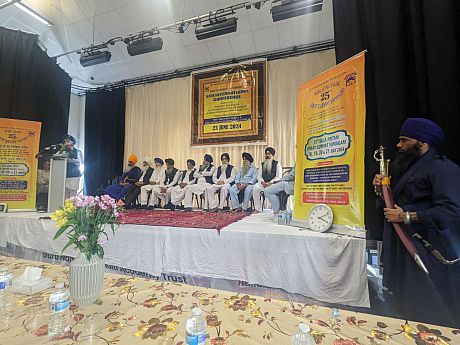
Above: The 6th International Conference at the Nehkaame Sewa & Guru Hargobind Singh Trusts
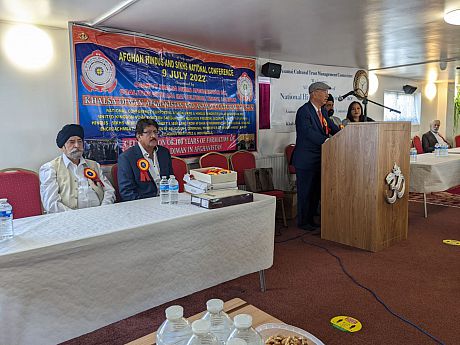
Above: Delegates of the Afghan Hindus and Sikhs 2022 National Conference
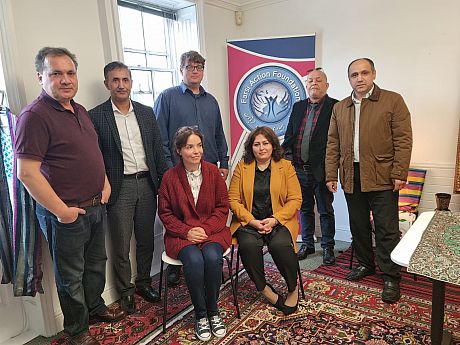
Above: The Farsi Action Foundation Opening, 14 October 2022
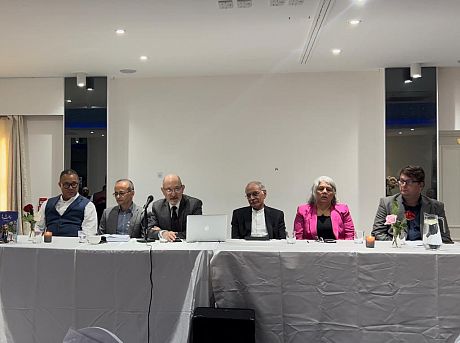
Above: Magnus Marsden speaking as part of a Panel, to mark the book launch of the memoirs of the former Mayor of Kabul
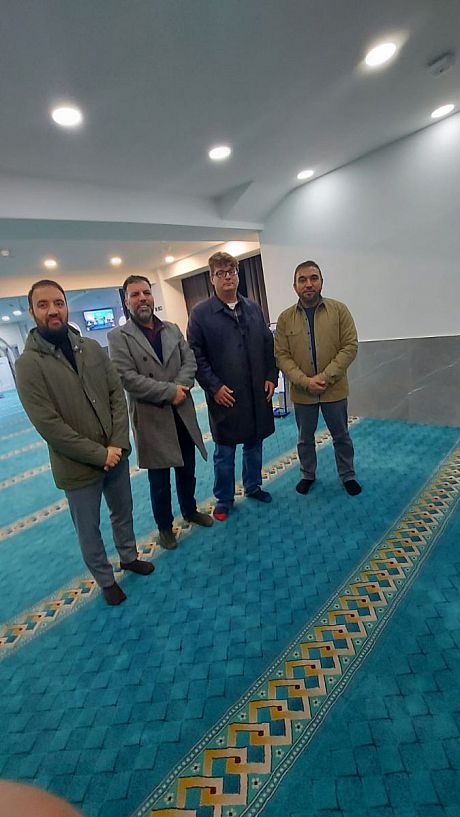
Above: Magnus Marsden visited the Afghan Islamic Cultural Centre in Neasden, London, November 2022
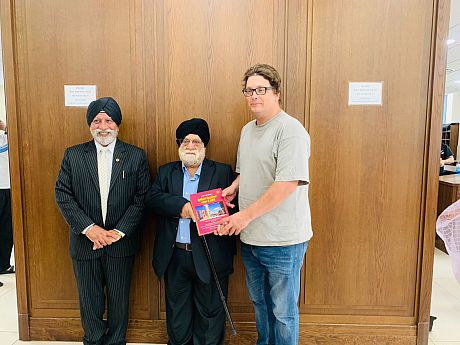
Above: On 2 May, Magnus Marsden attended an event held at the Guru Nanak Darbar in Southall to mark the publication of a book on the history of Afghan Sikhs by Dr Tej Khurana
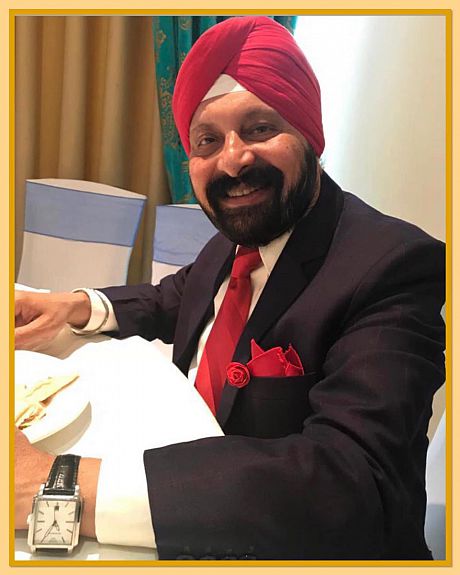
Above: Dr. Tej Khurana
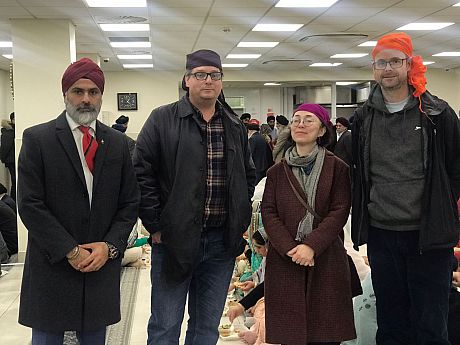
Above: Southall Centre. The 'Afterlives' team met in Southall to discuss and share their initial research findings with community organisations, including the Afghan EKTA cultural association and Gurdwara
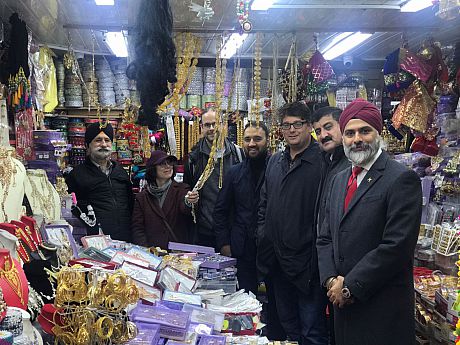
Above: Interior of a shop, Southall, where the 'Afterlives' team joined members of the local community
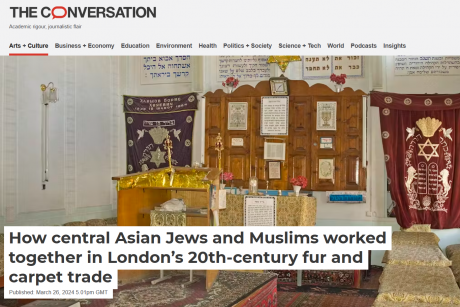
Above: An article on was published on 'How central Asian Jews and Muslims worked together in London’s 20th-century fur and carpet trade' on the 26 March by Magnus Marsden. The article appears in The Conversation at https://theconversation.com/how-central-asian-jews-and-muslims-worked-together-in-londons-20th-century-fur-and-carpet-trade-226283
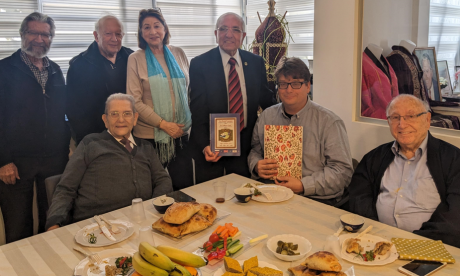
Above: Magnus Marsden holding a meeting with the leadership of the Union of Bukharian Jews in Tel Aviv to celebrate the organisation's 50th anniversary
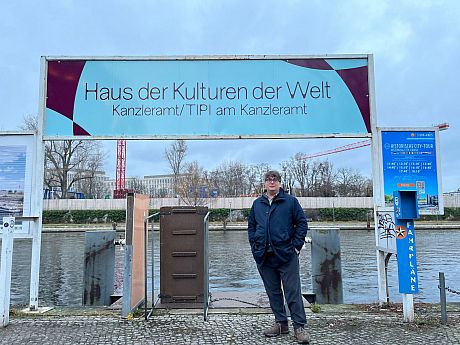
Above: Magnus Marsden visited Leipzig and Berlin, 1 - 4th December 2024. In Leipzig he consulted documents relating to the Karakul fur trade in the State archives and visited sites of historical importance to the trade. In Berlin, he held a meeting with staff at the Haus der Kulturen Der Welt who have commissioned him to write a book chapter exploring the relevance of his work for the Afterlives project to the forthcoming exhibition 'Musafiri: Travellers and Guests'.
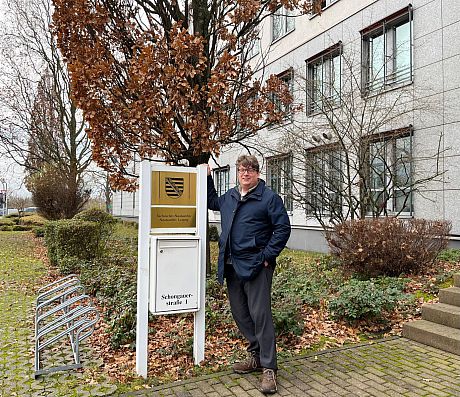
Above: Magnus Marsden at the Leipzig State Archives
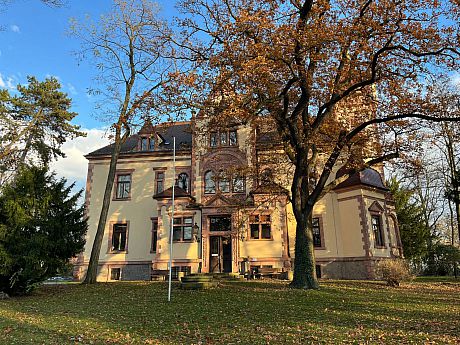
Above: Thorer Villa. The Villa was constructed by Curt Thorer in 1897. The Thorer family were the leading traders in Karakul fur in Leipzig from the middle of the nineteenth century until World War II. In the early 1900s, they also opened offices in Tashkent
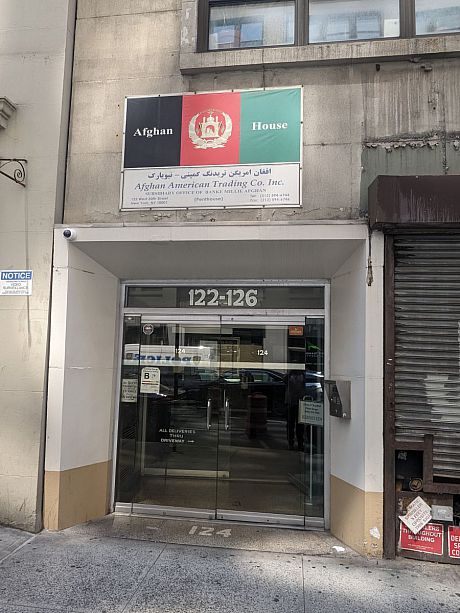
Above: The Hekmat Foushanji (Afghan American Trading Company) Building. During the course of visiting New York in August 2024, Magnus Marsden shared project results with the following associations: Hekmat Foushanji (Afghan American Trading Company), Jack Abrahams (Afghan Jewish community), Abdullah Khwajah (Turkestanian American Association, New Jersey), and the Committee of the Guru Nanak Darbar Gurdwara (Afghan Sikhs, Long Island). In addition to discussing the project's research, opportunities for further collaborations were also explored
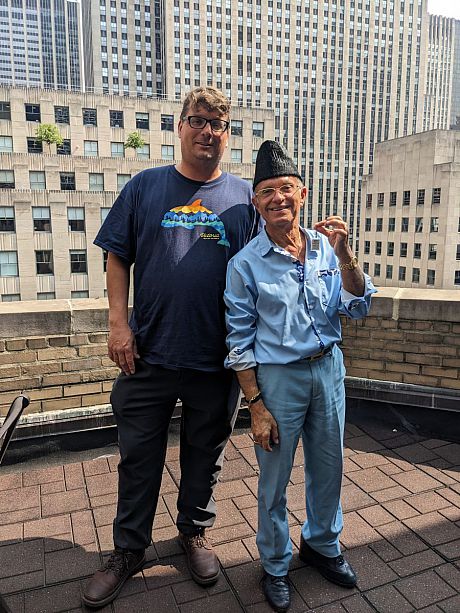
Above: Magnus Marsden with Jack Abrahams in New York, USA
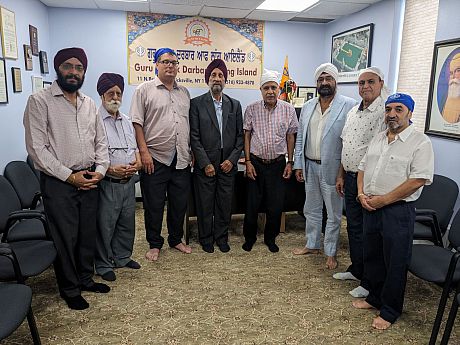
Above: Magnus Marsden with the Committee of the Guru Nanak Darbar Gurdwara (Afghan Sikhs, Long Island)

Above: A wall display
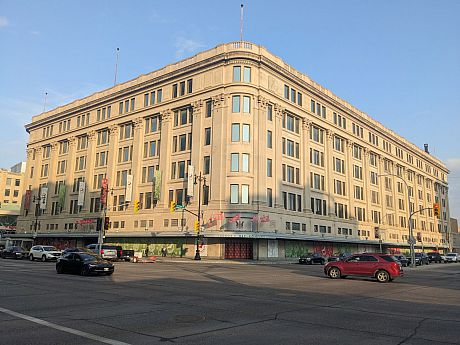
Above: Hudson's Bay Company department store in Winnipeg, USA
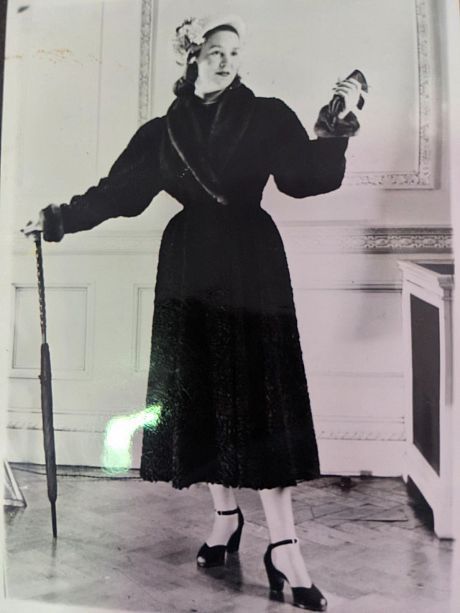
Above: Model in London wearing a coat made from Afghan Karakul fur (Hudson's Bay Company archives, 1950s)
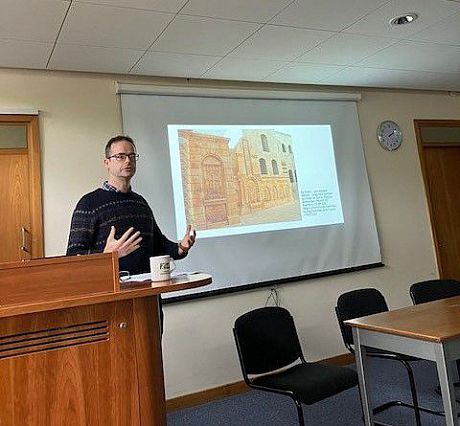
Above: Paul Anderson presenting at the Cambridge Festival. On the 27 March, Professor Marsden and Dr. Skvirskaja joined colleague Dr. Anderson in Cambridge for the Cambridge Festival, where they took part in a panel discussing the Afterlives of Urban Muslim Asia. The event was held at the Faculty of Asian and Middle Eastern Studies, as part of the Cambridge Festival of Ideas. You can find out more about it at https://www.festival.cam.ac.uk/events/afterlives-urban-muslim-asia
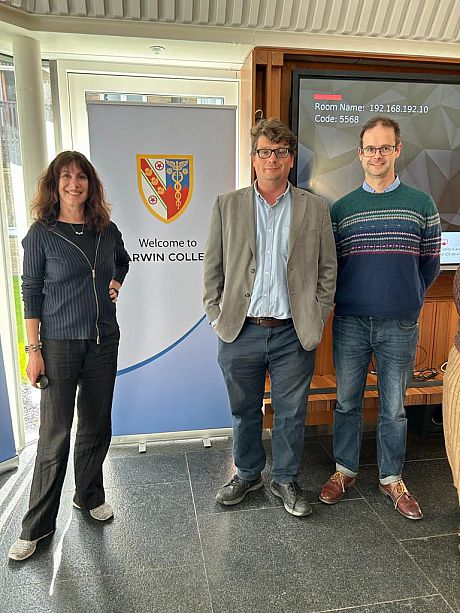
Above: Magnus and Paul are joined by local Brighton journalist Yael Breuer.
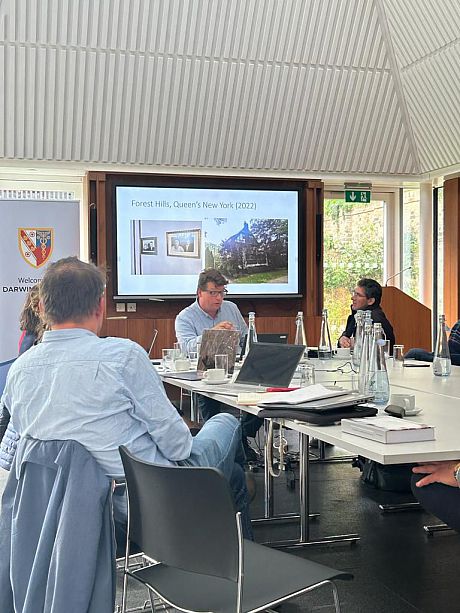
Above: May 2023, the researchers and Advisory Board met in Cambridge, UK to discuss the progress of the project and future developments
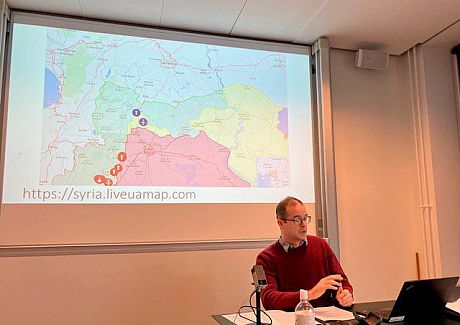
Above: The project held a one day workshop in collaboration with ADI in Copenhagen. The focus of the workshop was on the concept of 'afterlives' and its relevance to intersecting fields of regional and transregional scholarship. The workshop enabled members of team to bring their work into conversation with scholars in Denmark and Sweden who are specialists in the study of Palestine, Syria, and the Caucasus
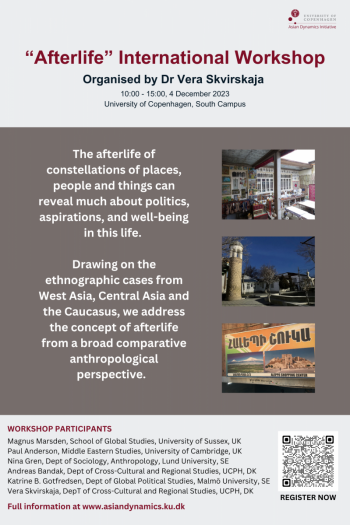
Above: Poster for the ADI Workshop
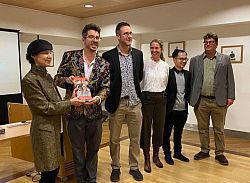
Above: Susan Bayly celebrating her book. At the end of September 2023, Magnus Marsden presented a paper entitled "Intellectual Exchange in Muslim Asia" at a symposium held at Christ's College Cambridge to celebrate the career of Professor Susan Bayly and mark the publication of the book "An Anthropology of Intellectual Exchange: Interactions, Transactions and Ethics in Asia (Berghahn 2023), An Anthropology of Intellectual Exchange: Interactions, Transactions and Ethics in Asia and Beyond"
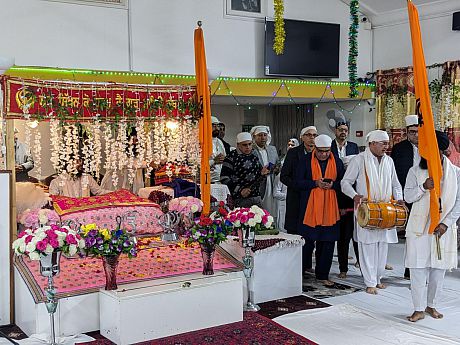
Above: Musicians at the Birthday Celebrations, Guru Nanak Society of London Trust Gurdwara in Tooting
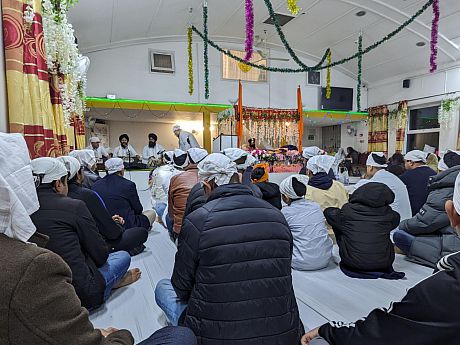
Above: Attendees at the Birthday Celebrations, Guru Nanak Society of London Trust Gurdwara in Tooting
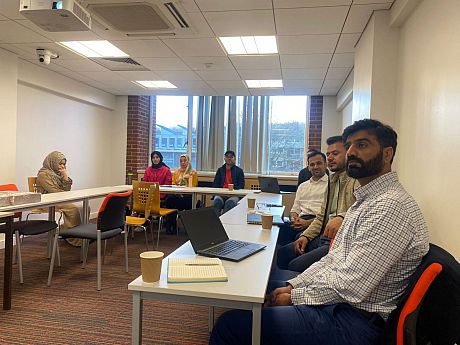
Above: On 21 November 2023, Magnus Marsden ran a three-hour focused seminar on research outline writing to students from Afghanistan studying at MA and PhD level across the campus. The seminar included students from Global, Education, Law, and Business Schools
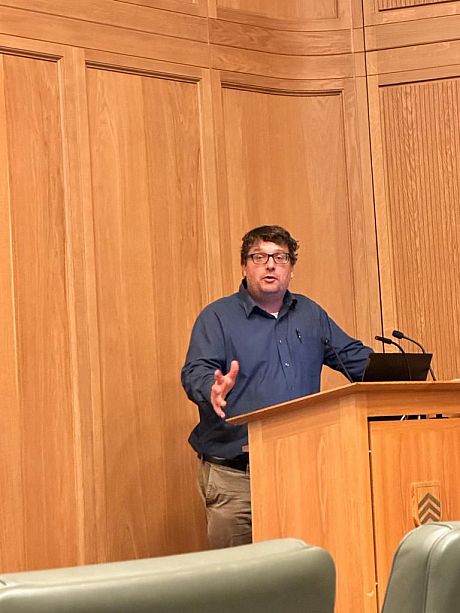
Above: Magnus Marsden delivering a speech at Oxford
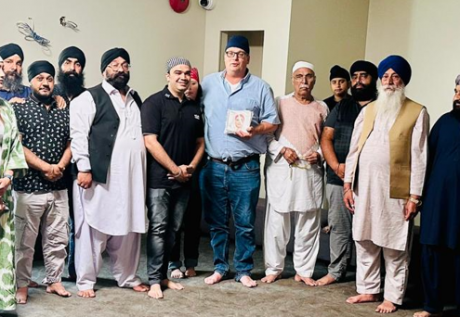
Above: Magnus Marsden with members of the Sri Guru Singh Sabha Gurdwara in Surrey, Vancouver. On Sunday 28 July, Magnus Marsden organised and attended an event at the Sri Guru Singh Sabha Gurdwara in Surrey, Vancouver, to share the findings of the project with the Afghan Sikh community in Canada. Magnus gave a talk about the project and presented members of the community with a booklet of Moska Najib's exhibition displayed at SOAS, University of London
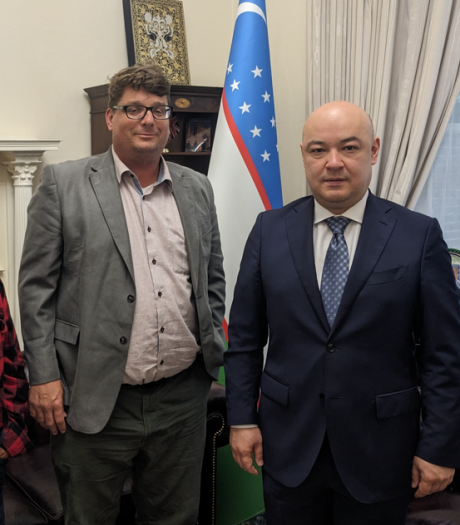
Above: On 8 August 2024, Professor Magnus Marsden discussed the project's findings with Uzbekistan's Ambassador to the UK, Ravshan Usmanov
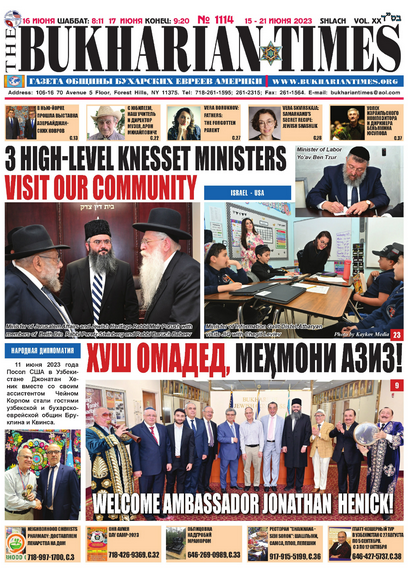
Above: June 2023, Vera Skvirskaja published an article in The Bukharian Times, titled ‘Samarkand’s Secret Recipe: Jewish Shashlik'
http://bukhariantimes.org/06_15_2023/mobile/index.html
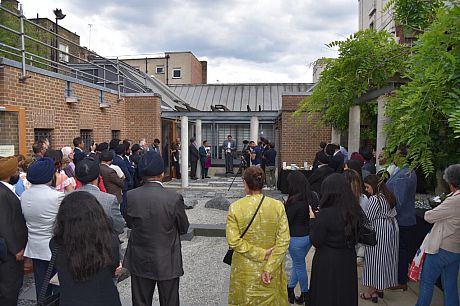
Above: 11 July 2024, the 'Afterlives' project launched a photography exhibition by project photographer Moska Najib. The exhibition - titled 'Belonging Flexibly: Non-Muslim Migrants from Muslim Asia' was on display until September 2024 at the Brunei Gallery, SOAS. During the launch, Moska Najib introduced the photographs. In addition, representatives of a wide range of community organisations established by Sikhs and Hindus from Afghanistan resident in the UK shared the impressions of the photographs and the relevance of them and the project more generally to their communities in and beyond London
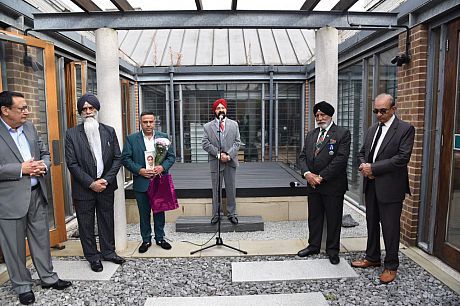
Above: Speeches from community leaders at the launch of the 'Belonging Flexibly' exhibition, SOAS, London
11th July 2024, the 'Afterlives' project held a conference at SOAS, University of London. The aim of the conference was to share and debate the project’s findings with participating communities, relevant government officials and heritage experts, the general public and relevant scholars. The first panel was chaired by Qaisra Khan (Curator at The Nasser D. Khalili Collection of Islamic Art). The speakers were Magnus Marsden (University of Sussex), Vera Skvirskaja (Copenhagen University), Paul Anderson (University of Cambridge), and Sudaba Zahidi (AISS). The second panel was chaired by Dawood Azami (Multi-Media Editor, BBC World Service). The speakers were Moska Najib (Afterlives project photographer), Thomas Loy (Oriental Institute, Czech Academy of Sciences and Afterlives Advisory Board member), Faisal Devji (University of Oxford) and Shah Mahmoud Hanifi (James Madison University and Afterlives Advisory Board Member).
The event was attended by representatives of various community associations in the UK, past and present government officials of the UK and Afghanistan, leading experts in the field of Islamic heritage presentation, members of the public, postgraduate students, and leading academics
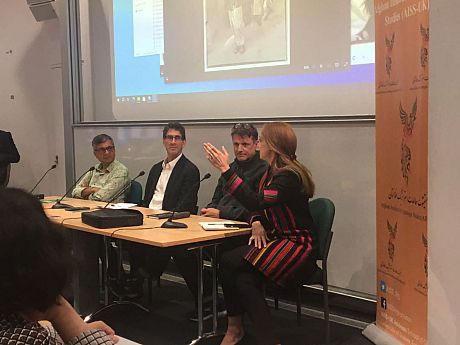
Above: Panel at the 'Afterlives' conference, SOAS, featuring project photographer Moska Najib
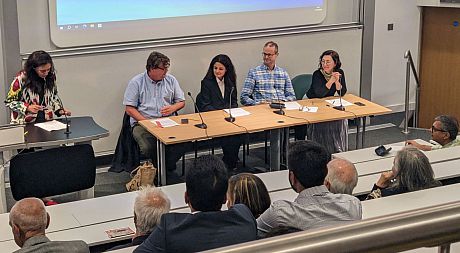
Above: Members of Panel 1, discussing the research
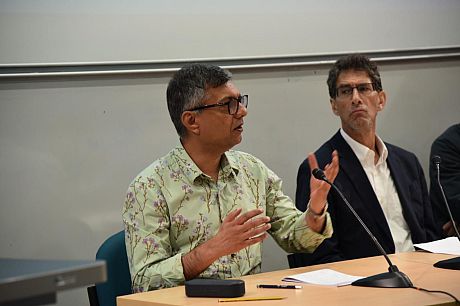
Above: Panel 2 discussing the research
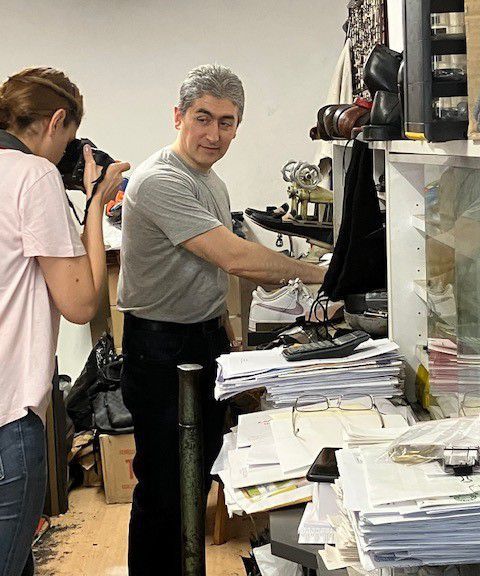
Above: Moska Najib capturing a shot of a shoe maker at work. The photos taken in Vienna and London formed the backbone of the exhibition.
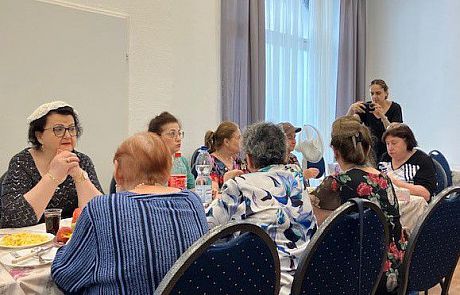
Above: Moska Najib photographing a social gathering. Moska accompanied Vera Skvirskaja there during Vera's fieldwork in June 2023. The main purpose of the trip was to document visually the vibrant social and professional life of the Bukharan Jewish community in the city
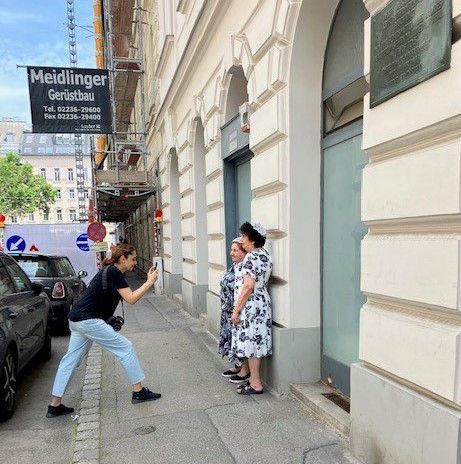
Above: Moska Najib taking photos on the streets of Vienna
Project photographer, Moska Najib (an award-winning photographer based in Delhi), travelled to some of the cities and accompanied the researchers on their fieldwork, capturing images of the communities and heritage sites. In July 2024 an exhibition of these photos went on display at SOAS' Brunei Gallery (London). The 'Belonging Flexibly' exhibition tells the story of non-Muslim communities from historically Muslim-majority cities in Asia, including (post) Soviet Central Asia, that migrated out of the region due to political instability, international intervention, and civil conflict. The exhibition emphasises the ongoing importance of their cities of origin to these communities’ sense of belonging, their cosmopolitan skills and their nuanced ways of dealing with diversity in the context of life in the diaspora.
In November the exhibition travelled to Copenhagen and the Royal Danish Library (South Campus), Denmark. The exhibition was sponsored by the Asian Dynamic Initiative at the University of Copenhagen. Moska was accompanied by Dr. Vera Skvirskaja, where they where welcomed by Dr. Trine Brox, Head of Research at the Department of Cross-Cultural and Regional Studies. See below for more information about the exhibition.
Belonging Flexibly
Over the past century, historic cities in Muslim Asia - such as Kabul and Herat (Afghanistan), Bukhara (Uzbekistan), and Aleppo (Syria) - have undergone profound transformations. Forces like nationalism, shifting religious identities, civil conflict, and international intervention have triggered widespread emigration, affecting both Muslim and non-Muslim populations alike. The emigration of non-Muslim communities has significantly altered the religious diversity of Muslim Asia’s cities. Neighbourhoods once home to diverse religious groups are now predominantly Muslim. Many non-Muslim places of worship have fallen into disrepair or been repurposed as 'heritage sites,' often becoming attractions for foreign tourists.
Despite these changes, the cosmopolitan spirit of these cities still lingers in the background. Our project traces the migration stories of both Muslim and non-Muslim residents from Afghanistan, Uzbekistan, and Syria to global cities like London, New York, and Vienna. We explore how these communities maintain their cultural identities and institutions, and how their connections to their cities of origin continue to shape their lives. Through our research, we’ve uncovered the pivotal role of social and economic relationships - often bridging religious divides - in sustaining the daily lives of migrant communities. These bonds, rooted in shared histories and experiences, continue to nurture a sense of belonging and solidarity. Pulling together the vibrant photographs taken by the researchers and our project photographer, Moska Najib, the 'Belonging Fexibly' exhibition explored the enduring diversity and resilience of the communities. The exhibition was curated by Moska Najib, an award-winning photographer and principal photographer for the project.
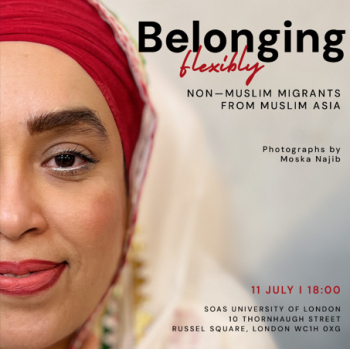
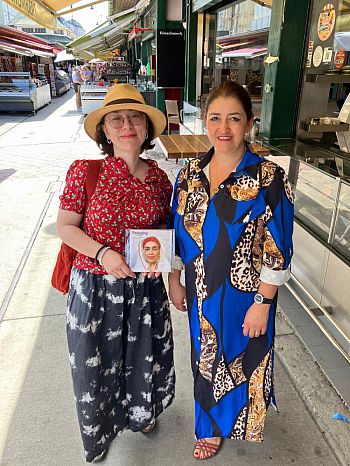
Above: Vera Skvirskaja sharing exhibition booklets with members of involved communities in Vienna, Austraia. After the photo exhibition ‘Belonging Flexibly’ in London, Vera Skvirskaja conducted some brief fieldwork in Vienna, focusing on the publishing activities and plans of Bukharan Jewish activists, meeting members of the Bukharan Jewish community who featured in the photo exhibition and/or facilitated the shooting session, as well as attending a Bukhran Jewish women’s study group. Vera noted there is a desire to popularise the knowledge about the Bukharan Jewish in Vienna (and Europe) - both their historical background, migration pathways and especially as their membership in the wider, national Jewish community of Austria - to the general public. This year (in November), the Bukharans will celebrate the 50th anniversary of the establishment of their community in Austria. Looking back, they are particularly proud of becoming a presence in Austrian public and political life. Recently, the Bukharan Jewish community has taken part in providing first assistance to the Jewish refugees from the war-affected Ukraine and facilitated their smooth introduction to Austrian society. Vera has followed up on the links between the Bukharan and Ukrainian Jewish communities in Vienna to map new transnational connections of this global diaspora
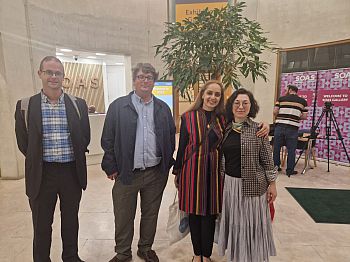
Above: The researchers and Moska Najib, at SOAS for the launch of the exhibition, July 2024
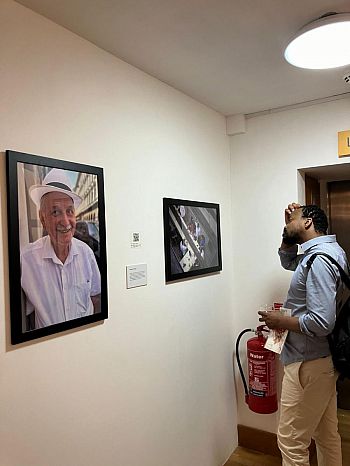
Above: Member of the public looking at the pictures in the exhibition, SOAS Brunei Gallery, London
In November 2024, Moska Najib traveled to Copenhagen to curate the exhibition at the Royal Danish Library, South Campus. The exhibition was sponsored by the Asian Dynamic Initiative at the University of Copenhagen. At the opening, it was welcomed by Dr. Trine Brox, Head of Research at the Department of Cross-Cultural and Regional Studies. Vera Skvirskaja introduced the 'Afterlives' project to an audience that included members of the Danish Afghan community. The opening also featured a talk between Moska and Professor Mette Sandbye from the Department of Arts and Cultural Studies, who specializes in photography and memory in contemporary art and society more broadly. Professor Sandbye highlighted the groundbreaking nature of the Afterlives project in that it has brought a professional photographer on board for the ethnographic research project and acknowledged the importance of visual storytelling from the start. The exhibition ran until mid-January 2025.
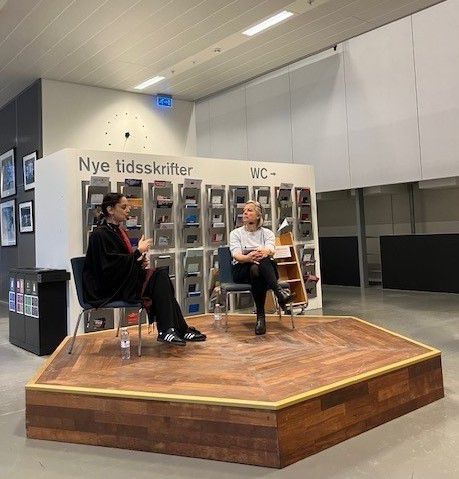
Above: Moska and Mette at the launch of the 'Belonging Flexibly' exhibition
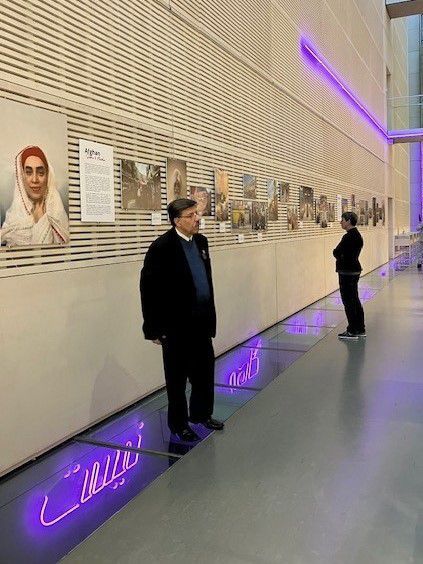
Above: Wall of photographs from the exhibition, Royal Danish Library, Copenhagen
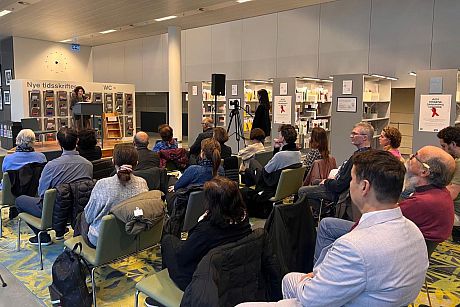
Above: Vera Skvirskaja addressing the crowd at the opening of the Copenhagen exhibition
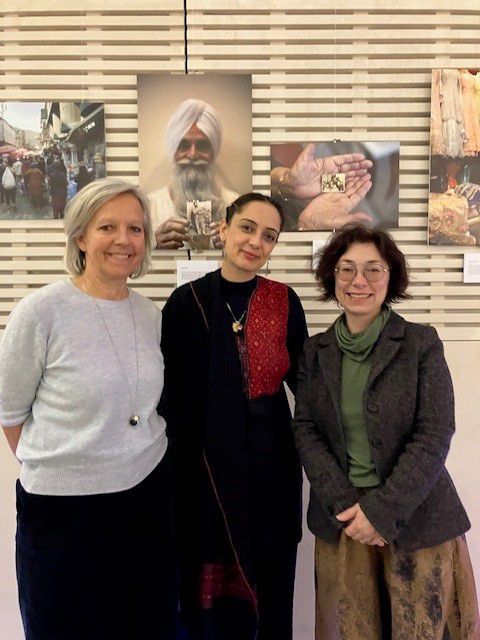
Above: Mette, Moska & Vera at the Copenhagen Exhibition
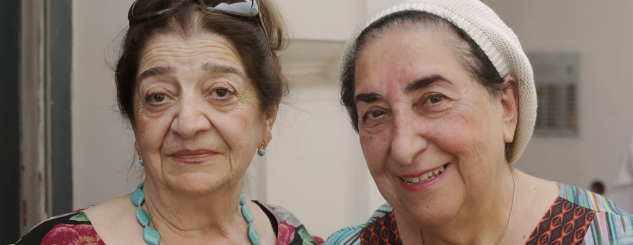
Above: Bukharan Jewish women in Vienna (exhibition image)
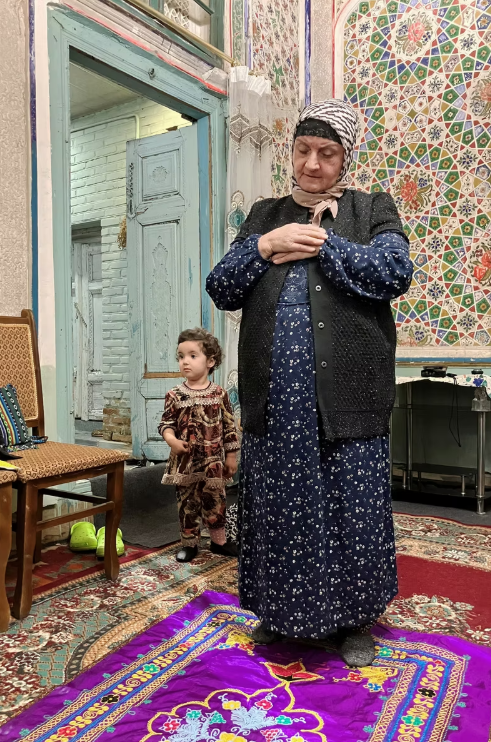
Above: Muslim woman in Bukhara, praying (exhibition image)
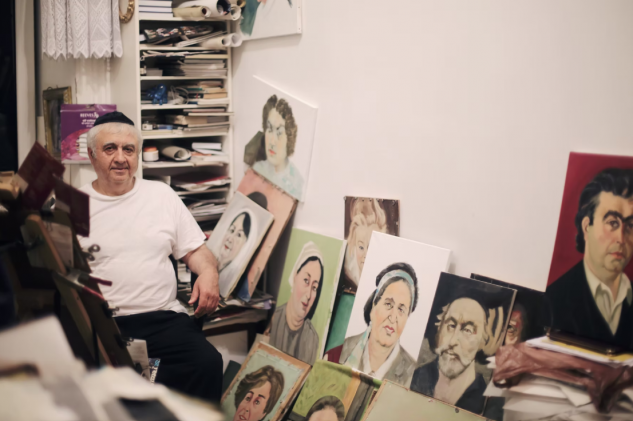
Above: An artist paints the Bukharan Jewish community, Vienna (exhibition image)
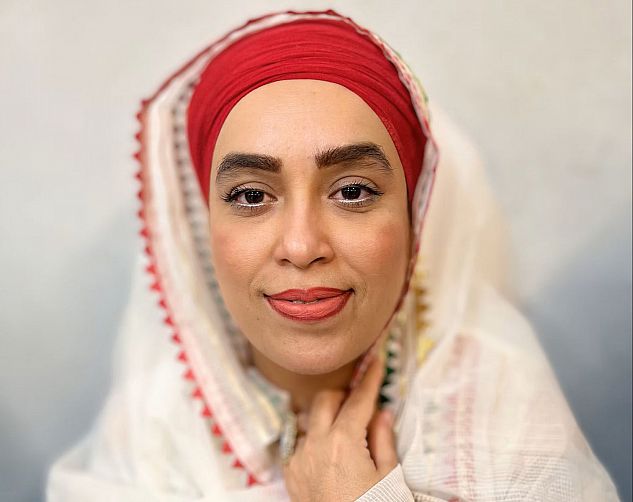
Above: Portrait of a woman (exhibition image)
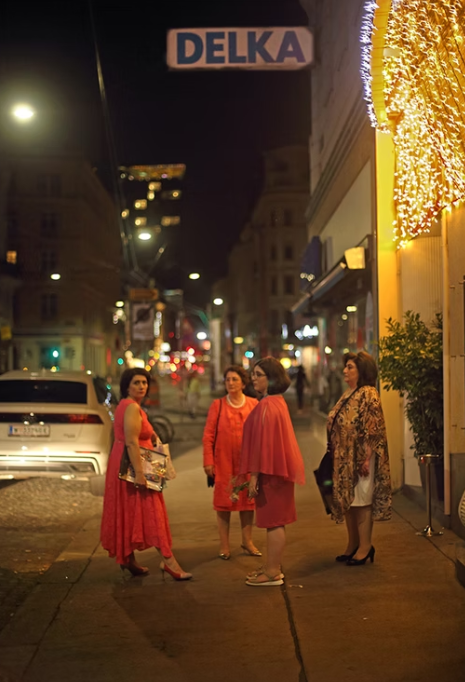
Above: Bukharan Jewish women gathered in Leopoldstadt, Vienna (exhibition image)
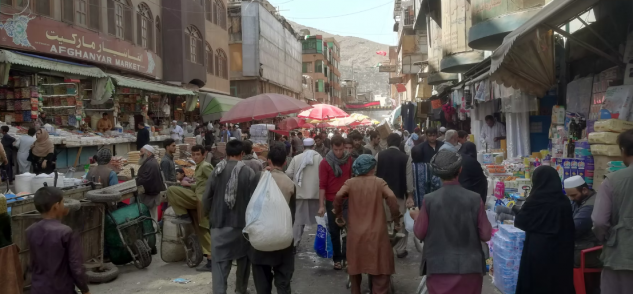
Above: Mandai Market, Kabul (exhibition image)
-->